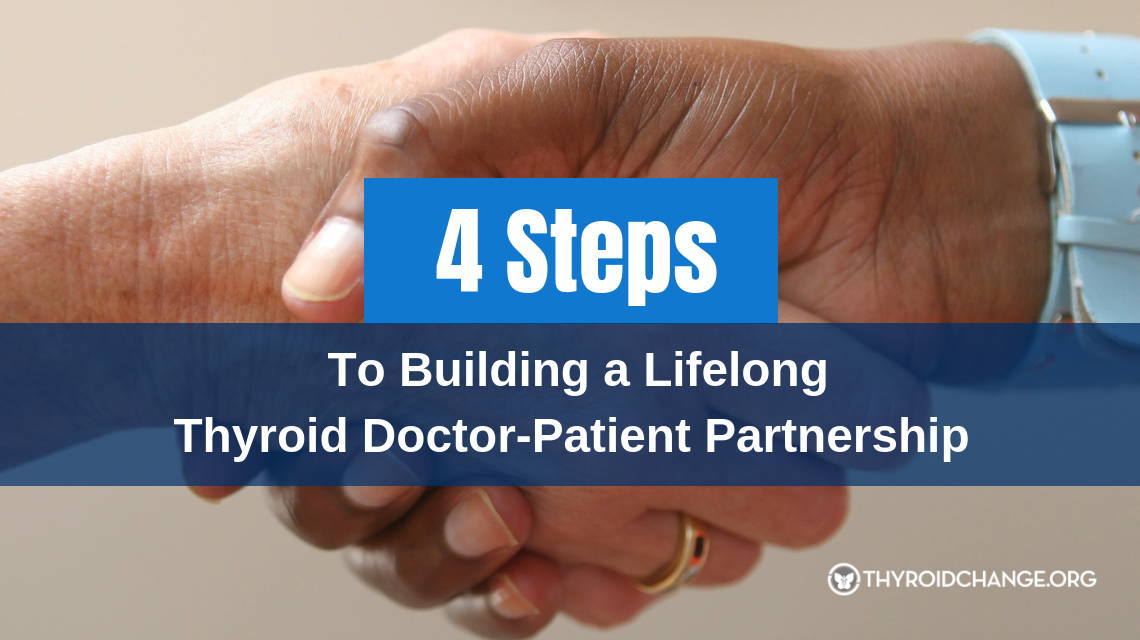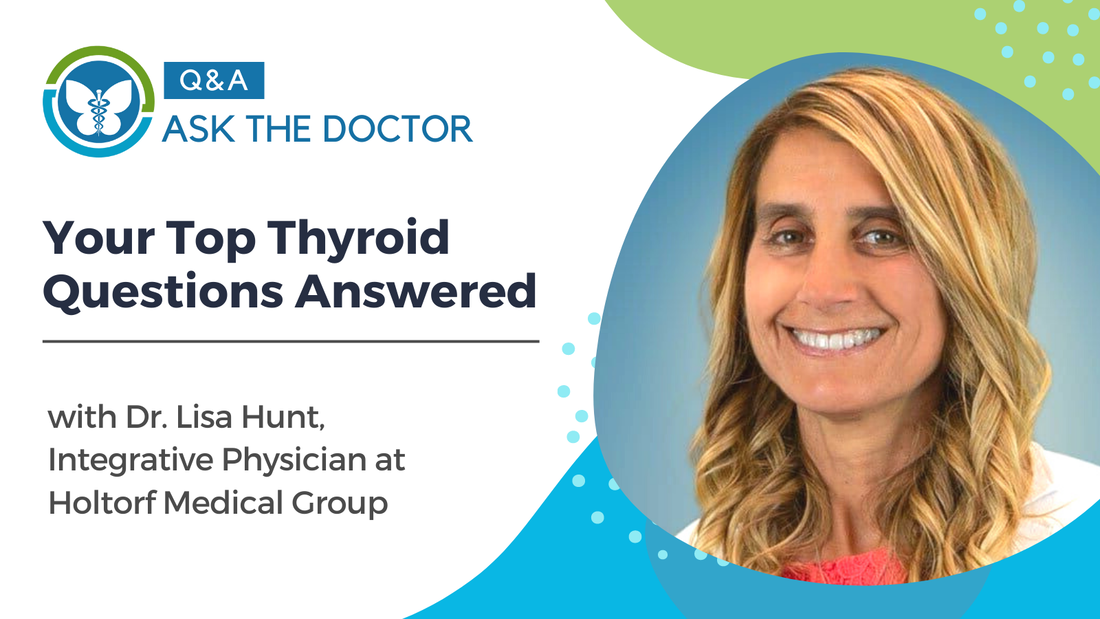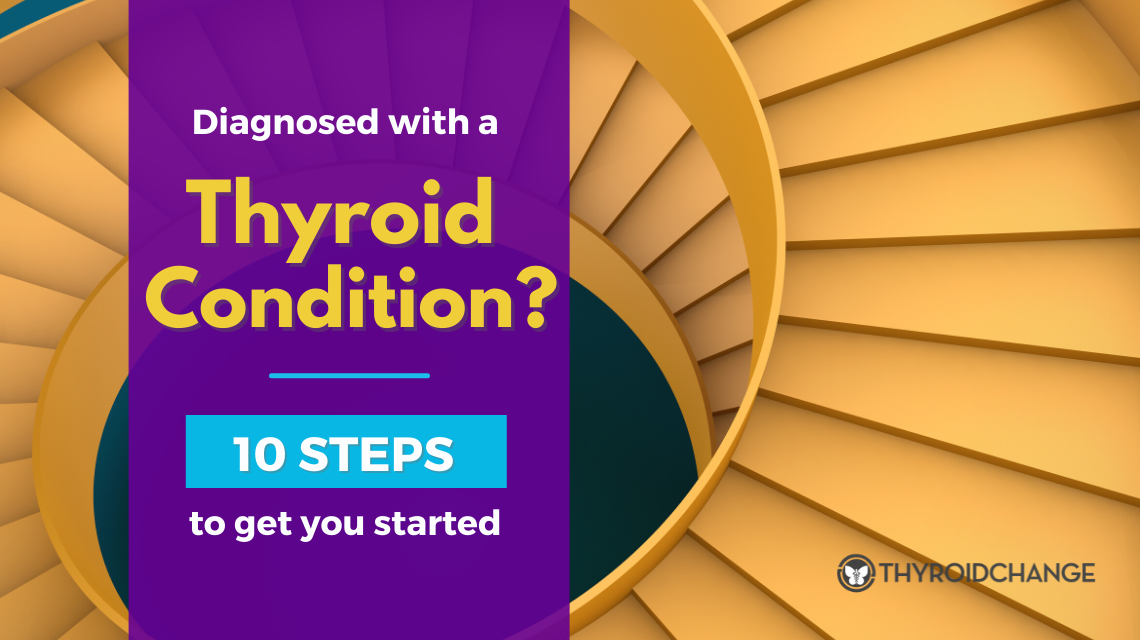15th Jun 2022
4 Steps To Building A Lifelong Thyroid Doctor-Patient Partnership

Building an effective support network is important in life especially when you have a chronic condition such as thyroid hormone imbalance or autoimmune thyroid disease. Dr. Brittany Henderson of the Charleston Thyroid Center offers four steps to help patients develop a lifelong thyroid doctor-patient relationship with a medical professional who fits their personal needs.
Have you ever walked out of a doctor’s visit feeling like it didn’t go so well? Was it painfully awkward and not at all productive? Did you feel like you were speaking different languages or, even worse, was the doctor condescending or rude? Did it leave you with feelings of confusion, hopelessness, or even anger?
If so, you are not alone.
Ill-fitted doctor-patient encounters happen all of the time. Sure, the awkwardness of the relationship might be tolerable if you only had to see the doctor annually for a check-up, but thyroid patients are different. On average, thyroid patients see their physicians upwards of three times a year, with some visiting the office more than six times annually. What’s more, in between clinic visits thyroid patients require labs and additional studies to monitor their progress and optimize their thyroid levels. Because of the intensity of treatment and lifelong care, thyroid patients need a doctor-patient relationship that lasts.
So how does one find such a relationship?
Step 1. Find a provider that listens.
Above all else, if the doctor or provider you are seeing is too busy to listen to your symptoms or writes you off as a hypochondriac, seek another opinion. As a patient, you deserve to be heard and your complaints acknowledged.
Even if your provider has no idea about what’s wrong or how to treat you, he/she should be an eager and active listener. Just like any worthwhile friendship, there should be equal give-and-take from both parties. A lasting doctor-patient relationship will never take root if both parties aren’t actively involved in treatment.
Step 2. Find a provider that truly cares.
This step is a bit tricky. Physician competence and physician caring are two different things. When you look for your thyroid doctor, look for a provider who will serve as your lifelong healthcare advocate. Finding a provider that listens doesn’t necessarily mean that he/she really cares.
There are several sure-fire ways to tell if the medical professional you have chosen truly cares about his/her patients:
- He/she goes above and beyond to find things out about your medical condition, even at times without reimbursement.
- He/she makes time for you at the clinic visit and after the clinic visit.
- He/she calls you personally on the phone, especially with bad news.
Step 3. Find a provider that is experienced and knowledgeable.
Finding a qualified provider can be difficult. Nowadays, anyone can market that they have knowledge on how to treat a medical condition, regardless of credentials or education. Be a critical consumer of your healthcare. Ask your provider about his/her training in thyroid care.
Ideally, your thyroid provider should see thyroid patients routinely (40% of his/her practice or more) and have extensive training in the management of thyroid disease. Try to avoid practitioners who aren’t thyroid experts or who have solely had a weekend training course in thyroid disease.
There are tips and resources that can help you in your search for a qualified provider:
- Call and ask practice about the provider’s approach to thyroid treatment and if they would be open to treatment approaches that you would like to explore.
- Ask your friends for recommendations and read online patient reviews.
- Find a physician on thyroid-specific sites like ThyroidChange.
- Try out multiple providers (it’s OK and normal to seek a second or third or fourth opinion!) and ask all of them your most important questions. It will be evident who knows his/her stuff based on their ability to accurately and confidently answer your questions (and who blows them off!). Here are some suggestions on controversial issues that can really help stratify thyroid care providers:
- What is your medical opinion for why some people with “normal” thyroid levels continue to experience thyroid-related symptoms?
- What is your opinion on the utility of testing for other thyroid-related tests outside of the TSH level?
- What is your experience with thyroid replacement medicine? Do you use all available therapies with your patients or do you restrict your practice to 1 or 2 specific types of thyroid medicines?
- Do you perform your own thyroid ultrasound assessments and thyroid nodule biopsies, if needed?
- Do you regularly participate in national or international meetings or associations that deal with the most up-to-date thyroid treatments and medical research?
Step 4. Build a lasting partnership.
This one takes time. No, this doesn’t mean crossing the proverbial doctor-patient line and becoming BFF’s with your thyroid doctor. But it does mean building a long-lasting doctor-patient relationship that lasts. An effective thyroid working relationship is a partnership between patient and physician working together to optimize thyroid health. If you are experiencing worsened thyroid symptoms, you should feel like you can easily contact your provider to update your blood work and ensure that your thyroid levels are optimized.
You and your thyroid physician should be a team.
You should be working together through the addition of new medicines, comorbidities, weight changes, pregnancy, menopause, Hashimoto’s flares, and changes in thyroid medicine absorption, all of which can affect your thyroid health. Thyroid disease management is a lifelong journey and your thyroid provider should be a true partner in your care.
I hope that you find the thyroid medical partner that you are looking for. And if you haven’t yet—I hope you continue searching. Your best thyroid health is worth it.
About the Author

Brittany Henderson, MD, ECNU directs The Charleston Thyroid Center which employs traditional and complementary treatment modalities to address the needs of patients with thyroid disease. Board-certified in internal medicine and endocrinology, with advanced training in thyroid disorders, Dr. Henderson specializes in autoimmune thyroid disease, thyroid nodules, thyroid cancer, ethanol ablation and advanced minimally invasive techniques. Co-author of the book, “What You Must Know About Thyroid Disease,” Dr. Henderson believes knowledge is power. She desires to improve quality of life for those living with thyroid disease both through novel research and medical guidance.
SIMILAR ARTICLES
More like this...

15th Jun 2022
Your Top Thyroid Questions Answered: Q&A with Dr. Lisa Hunt of Holtorf Medical Group
I had the pleasure of speaking with Lisa Hunt, D.O., an integrative physician at Holtorf Medical Group (www.holtorfmed.com) in El Segundo, CA a short while ago. I polled my audience and your top thyroid-related questions are answered here by Dr. Hunt. Dr. Hunt is a board-certified integrative physician and has extensive experience in thyroid health, hormone replacement, immune dysfunction and chronic conditions.
Read Article
15th Jun 2022
Diagnosed With a Thyroid Condition? 10 Steps to Get You Started
Pursuing proper treatment and an overall healthy lifestyle that includes eating well and exercising can help you manage a thyroid condition. But what else can you do to live well with and thrive with your condition? The information can be overwhelming and Annabel Bateman, thyroid health advocate and author, has created this guide to walk you through essential lifestyle tips once you have been diagnosed.
Read Article
15th Jun 2022
11 Tips On How To Take Your Thyroid Medication Properly
Are you taking your thyroid hormone replacement medication correctly? Did you know that how and when you take your thyroid medication can affect your ability to absorb the necessary hormone properly? In the article below, I investigate the factors that contribute to correctly (or incorrectly) taking thyroid replacement hormone and on how thyroid patients can get the most out of their medication.
Read Article